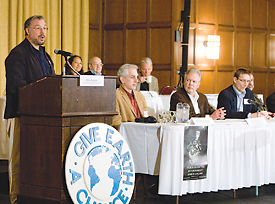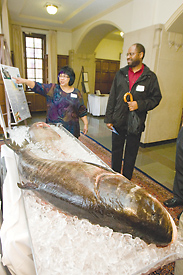Environmental problems facing the planet today are as urgent as those that existed 40 years ago, when the first Earth Day took place. But today’s challenges are much more complex, and solving them will require unprecedented levels of global cooperation between scientists, politicians and policymakers, as well as widespread public support.
With that summary statement, Donald Scavia, special counsel to the U-M president on sustainability, closed a morning Teach-In on March 25 about environmental issues. The event at the Michigan League recalled a March 1970 U-M Teach-In that drew 15,000 people and served as an inspiration and model for the first Earth Day, one month later.

Don Scavia, director of the Graham Environmental Sustainability Institute and special counsel to the U-M president on sustainability, addresses the March 25 Teach-In on environmental issues at the Michigan League. Photo by Scott Soderberg, U-M Photo Services.
The Teach-In was one of several March events celebrating the university’s role in launching the environmental movement 40 years ago.
“We’re all in this together, and this Teach-In is about collective action,” Scavia told the audience. About 20 U-M faculty members, students and outside experts participated in panel discussions on four topics: Great Lakes and water resources, climate and energy, food and human health, and sustainable accessibility.
Decades ago, when Ohio’s Cuyahoga River repeatedly caught fire and factory smokestacks belched toxic substances skyward, many of the major pollution sources were easy to identify, Scavia said. Today, a lot of the most serious threats are less obvious: mounting levels of invisible carbon dioxide gas trap heat and alter the global climate, while “biological pollution” from various invasive species is transforming the delicate Great Lakes ecosystem, for example.
Since 1950 one new, non-native species has entered the Great Lakes every 28 weeks, despite the fact that there are about 140 programs aimed at promoting Great Lakes health.
“There’s a severe deficiency in coordinating the actions of these various groups,” said Jeremy Guest, who moderated the Great Lakes and water resources panel. Guest is a graduate student in civil and environmental engineering and a fellow at the Graham Environmental Sustainability Institute.
More than 100 people attended last Thursday’s Teach-In.
In the climate session, Henry Pollack, professor emeritus of geological sciences, noted that human-produced emissions of carbon dioxide and other heat-trapping gases have already guaranteed “unavoidable” climate change that will result in the loss of most of the world’s mountain glaciers (except in Asia) by the end of the century.

Participants at the Teach-In were able to get a close-up look at this 70-pound Asian carp, which was on display in the hallway outside a panel discussion on Great Lakes and water resources. Photo by Scott Soderberg, U-M Photo Services.
“We will see significant climate change, even if we were somehow able to go cold turkey today and stop all emissions of greenhouse gases,” said Pollack, who was a contributing author to the landmark 2007 Intergovernmental Panel on Climate Change reports.
“We’ve got 20 to 30 years to flatten the growth of CO2 (carbon dioxide) and begin to diminish it to safe levels,” Pollack said. “And the way to do that is to reshape the economy so it’s based on non-carbon sources.”
But moving away from a reliance on fossil fuels will be difficult and painful, and technological quick fixes are not on the horizon, said Carl Simon, a professor of public policy, mathematics and economics, and associate director of the Michigan Memorial Phoenix Energy Institute.
Electric vehicles and energy sources such as wind, solar, nuclear and biofuels may help begin to wean this nation from fossil fuels, but other solutions will be needed, Simon said.
“It will take behavioral change and probably government incentives,” he said.
“We think of energy as a technological or fuel-oriented problem, and I see it more as a social dilemma that involves behavior, prices and regulation,” he said. “There’s an idea that technology has saved our butts before and will do it again. But alternatives to fossil fuels — I don’t see a clear cure or substitute. New technologies have huge obstacles and huge costs.”
The Teach-In was sponsored by the U-M Alumni Association; the Office of the Vice President for Communications; LSA; the Gerald R. Ford School of Public Policy; the School of Public Health; the Graham Institute; the Office of Campus Sustainability; and Planet Blue.

